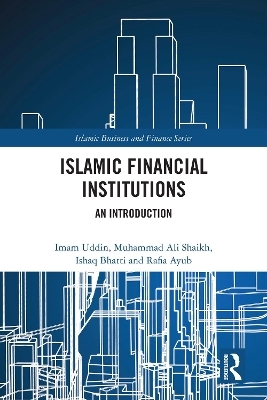
Islamic Financial Institutions
An Introduction
Seiten
2024
Routledge (Verlag)
978-1-032-78932-3 (ISBN)
Routledge (Verlag)
978-1-032-78932-3 (ISBN)
Provides a comprehensive overview of Islamic Financial Institutions, exploring current issues including governance, Shariah compliance frameworks and regulatory aspects, as well as the principles involved in product structuring. Offers an understanding of Islamic financial instruments and their implementation in different regions.
This book provides a comprehensive overview of Islamic Financial Institutions, exploring current issues, including governance, Shariah compliance frameworks and regulatory aspects, as well as the principles involved in product structuring.
It offers a basic understanding of Islamic financial instruments and their implementation in different regions. The book begins by introducing the Islamic financial system, its objectives, the financial intermediation process, the philosophy and methods of mobilization and utilization of funds followed by an overall comparison with the conventional financial system. It offers a definition and explanation of types of riba, sources of prohibition, the difference between riba and profit, types of transactions which involve interest and the adverse effects of interest on the economy. It covers a detailed study of Islamic financial contracts and discusses trade-based financing products, illustrating the structural and legal differences between conventional and trade-based financing products. Further, the book outlines the criteria for the determination of Shariah compliant status of equity securities, and the role and functions of capital markets in an Islamic framework. Finally, it goes on to present an overall model of an Islamic bank in comparison with a conventional bank, examining its methodology and procedures for ensuring shariah compliance, governance and regulation, keeping in view the operating strategies, risk management issues, liquidity requirements and so on.
The book will be used by researchers, students and scholars of Islamic Banking and Finance and will also serve as a practical guide for bankers and finance professionals who wish to enhance their knowledge in the field, as well as those embarking on professional training or certification programs.
This book provides a comprehensive overview of Islamic Financial Institutions, exploring current issues, including governance, Shariah compliance frameworks and regulatory aspects, as well as the principles involved in product structuring.
It offers a basic understanding of Islamic financial instruments and their implementation in different regions. The book begins by introducing the Islamic financial system, its objectives, the financial intermediation process, the philosophy and methods of mobilization and utilization of funds followed by an overall comparison with the conventional financial system. It offers a definition and explanation of types of riba, sources of prohibition, the difference between riba and profit, types of transactions which involve interest and the adverse effects of interest on the economy. It covers a detailed study of Islamic financial contracts and discusses trade-based financing products, illustrating the structural and legal differences between conventional and trade-based financing products. Further, the book outlines the criteria for the determination of Shariah compliant status of equity securities, and the role and functions of capital markets in an Islamic framework. Finally, it goes on to present an overall model of an Islamic bank in comparison with a conventional bank, examining its methodology and procedures for ensuring shariah compliance, governance and regulation, keeping in view the operating strategies, risk management issues, liquidity requirements and so on.
The book will be used by researchers, students and scholars of Islamic Banking and Finance and will also serve as a practical guide for bankers and finance professionals who wish to enhance their knowledge in the field, as well as those embarking on professional training or certification programs.
Imam Uddin is Professor and Head of the Department of Accounting and Finance, Institute of Business Management, Korangi Creek, Karachi, Pakistan.
Part 1: Building the Islamic Financial Framework 1. An overview of the Islamic economic system 2. Prohibition of Riba 3. An introduction to Islamic Finance Part 2: Financing Solutions In Islamic Banking 4. Islamic financial Contracts 5. Trade-based financing products 6. Financing based on Ijarah 7. Partnership-based financing products 8. Deposit taking by Islamic banks Part 3: Islamic Financial Institutions and Operations 9. Model of an Islamic bank 10. Shariah Governance Framework 11. Equity Investments and Capital Markets 12. Modarabah – An Entity 13. Bibliography
| Erscheinungsdatum | 21.11.2024 |
|---|---|
| Reihe/Serie | Islamic Business and Finance Series |
| Zusatzinfo | 25 Tables, black and white; 16 Line drawings, black and white; 16 Illustrations, black and white |
| Verlagsort | London |
| Sprache | englisch |
| Maße | 156 x 234 mm |
| Gewicht | 694 g |
| Themenwelt | Geisteswissenschaften ► Religion / Theologie ► Islam |
| Sozialwissenschaften ► Soziologie ► Spezielle Soziologien | |
| Wirtschaft ► Allgemeines / Lexika | |
| Wirtschaft ► Betriebswirtschaft / Management ► Finanzierung | |
| Betriebswirtschaft / Management ► Spezielle Betriebswirtschaftslehre ► Bankbetriebslehre | |
| Wirtschaft ► Volkswirtschaftslehre ► Makroökonomie | |
| ISBN-10 | 1-032-78932-8 / 1032789328 |
| ISBN-13 | 978-1-032-78932-3 / 9781032789323 |
| Zustand | Neuware |
| Informationen gemäß Produktsicherheitsverordnung (GPSR) | |
| Haben Sie eine Frage zum Produkt? |
Mehr entdecken
aus dem Bereich
aus dem Bereich
warum unser Geld stirbt und wie Sie davon profitieren
Buch | Hardcover (2024)
FinanzBuch (Verlag)
30,00 €
Erinnerungen des Chefökonomen
Buch | Hardcover (2024)
Vahlen (Verlag)
24,90 €


